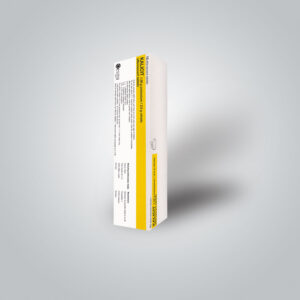 KALICIT effervescent tablets
KALICIT effervescent tablets
KALICIT
International non-patented name: Kalicit
Composition:
Active ingredients: 1 tablet contains 2.17 g of potassium citrate, 2.0 g of potassium bicarbonate, 2.057 g of anhydrous citric acid.
Excipients: sucrose and glucose syrup, macrogol 6000, saccharin, lemon flavoring D-Sorbitol.
Description:
They are white, round-shaped, effervescent tablets with a rough surface and sharp edges on both sides.
Pharmacotherapeutic group:
Medicine to normalize potassium balance and prevent the formation of kidney stones.
ATC : A12BA30.
Pharmacological properties:
Pharmacodynamics
Calcite reduces the concentration of potassium salts and prevents crystallization in urine. It alkalinizes the urine by raising its pH. Due to this alkalizing effect, it also increases the dissociation of uric acid and reduces the formation of urate salts.
Potassium citrate is superior to sodium citrate in preventing urolithiasis. Citrate affects the physico-chemical composition of urine: it increases the solubility of urates, reduces the calcification of oxalate, helps to dissolve formed stones.
Pharmacokinetics
Most of the ingested potassium-citrate is absorbed and completely oxidized to carbon dioxide and water. Excess alkaline cations formed during this period are excreted by the kidneys within 24-48 hours without changing the acid-alkaline balance of the blood. Most of the ingested potassium-citrate is absorbed and completely oxidized. At this time, potassium ions are released. During hypokalemia, potassium ions increase the urinary excretion of citrater.
Instructions for use:
In the case of potassium deficiency in the human body:
- severe hypokalemia (<3.2 mmol / l), mainly due to metabolic acidosis,
- hypokalemia caused by impaired activity of the neuromuscular system and heart rhythm disturbances.
Hypokalemia caused by taking drugs containing pertussis during treatment.
For the prevention of hypokalemia caused by ketoacidosis.
For metaphylaxis of kidney stone disease.
- Calcium stones (calcium stones caused by acidosis in the renal canals)
- Hypocitraturia of various origins (<320 mg/day)
- Stones caused by increased uric acid.
Contraindications:
Hyperkalemia
Glucose-galactose malabsorption and deficiency
Kidney failure.
Urinary tract infections
Urinary obstruction
Adrenocortical insufficiency
Hyperkalemia
Metabolic or respiratory alkalosis
Peptic ulcer
Intestinal obstruction
Patients receiving anticholinergic therapy and suffering from heart pain, which may be aggravated by potassium intake.
Special instructions and precautions:
In patients with anemia.
The experience of using Kalisit in children and adolescents is limited. Therefore, Kalisit tablets are not intended for use by children and adolescents.
Elderly patients should consult a doctor before using the drug.
Interaction with other drugs:
Reduces the effect of cardiac glycosides.
Calcite should not be prescribed together with some cholinolytic drugs, diuretic drugs and ACE inhibitors.
Use during pregnancy and lactation:
There is no information about the adverse effects of the drug during pregnancy and lactation. If treatment with the drug is necessary, then the treatment should be carried out under strict medical supervision.
Method of use and dosage:
Dosage
For potassium replacement
The replacement dose is determined by potassium deficiency; it is usually enough to take 40-80 mmol of potassium per day. The dose should not exceed 160 mmol per day. An individual dose should not exceed 40 mmol – which is equivalent to 1 Calcite effervescent tablet.
For metaphylaxis of kidney stones.
The dose should be selected individually by the doctor so that the excretion of citrate does not exceed 320 mg per day and the urine pH is not higher than 6.2-6.8.
These results can be achieved after taking 1-2 effervescent tablets.
An individual dose of Calcite should not exceed one effervescent tablet, which is equivalent to 40 mmol of potassium.
The daily dose should not exceed 4 effervescent tablets, which is equivalent to 160 mmol of potassium per day.
The daily dose should be 2 or more effervescent tablets, divided into several times during the day.
In cases of potassium deficiency, a few days or weeks of intake are enough to achieve a normal balance.
In children
Calcite effervescent tablets are not prescribed for children and adolescents as there are no indications.
Instructions for use
It is accepted after complete dissolution. 1 effervescent Kalicit tablet dissolves in 1 glass of water (200 ml) and can be sweetened with sugar or fruit juice as needed. It is taken in small sips within 10-15 minutes. Taking Calcite with food improves gastrointestinal tolerance.
Side effects:
Rarely – nausea and vomiting. The indicated side effects are usually transient and do not require discontinuation of the medicine.
Overdose:
Symptoms of intoxication in case of overdose are not described.
Packing :
15 effervescent tablets in a polyethylene-coated polypropylene plastic tube. 1 tube is packed in a cardboard box with a leaflet.
Store condition:
It should be stored at a temperature not higher than 25ºС, protected from light, in the original box and out of the reach of children..
Shelf life:
5 years.
By prescription.
Manufacturer:
Nordmark Arzneimittel GmbH & Co. KG
Pinnauallee 425436 Uetersen, Germany.
